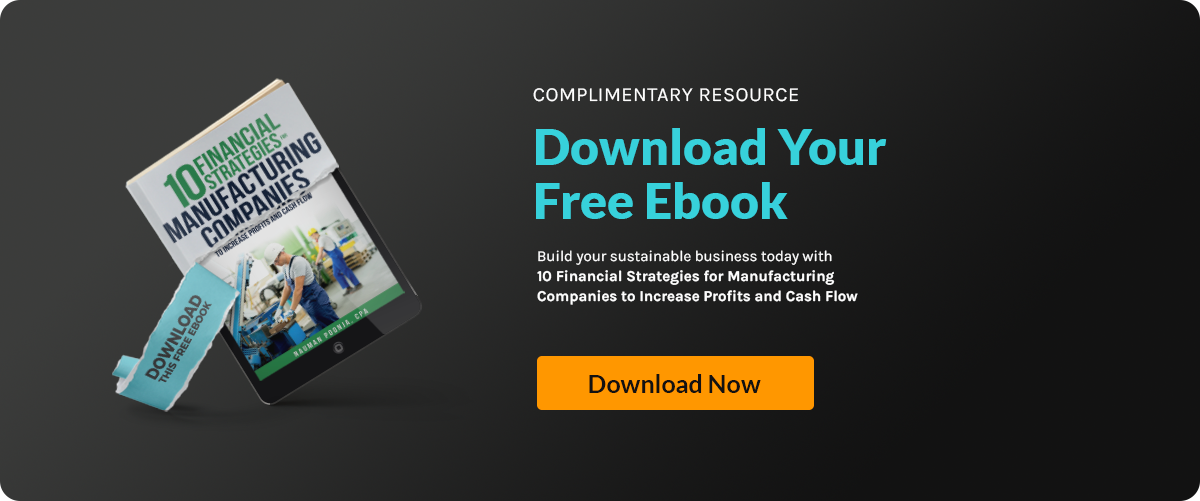Your gross margin is 28%. Industry leaders in your space operate at 45-50%. You're delivering...
Enhancing Efficiency with Expert Manufacturing Finance Strategies

Running a manufacturing business presents unique challenges, especially when it comes to maintaining financial efficiency. In this industry, you know that every penny saved and every process streamlined can make a huge difference. But what if you could transform your financial strategy to maximize efficiency and profitability?
With the proper expert guidance and industry-specific strategies, you can turn financial challenges into opportunities for growth and improvement. Are you ready to take your manufacturing operations to the next level? Keep reading to discover proven methods and expert guidance to help you enhance your manufacturing operations.
The Importance of Financial Efficiency in Manufacturing
Financial efficiency is vital for the success and growth of any manufacturing business. Efficient financial management helps optimize resources, reduce costs, and improve profitability.
Here are the key reasons financial efficiency is crucial in the manufacturing industry.
Optimized Cash Flow
Efficient financial management ensures a steady cash flow, which is crucial for day-to-day operations. It helps manufacturing companies cover expenses, invest in new projects, and maintain liquidity, preventing financial crunches and ensuring smooth operations.
Improved Financial Performance
Business owners can enhance their company's financial performance by focusing on key financial metrics such as turnover and profitability. Regular financial analysis and strategic adjustments improve financial health and long-term sustainability.
Enhanced Operational Efficiency
Financial efficiency allows manufacturing companies to streamline operations and upgrade processes. This includes investing in new technologies and optimizing raw materials, which boosts productivity and reduces waste.
Access to Lines of Credit
Maintaining solid financial health makes it easier for manufacturing companies to secure lines of credit. This is essential for funding expansions, purchasing equipment, and handling unforeseen expenses. A solid financial standing aligns with lenders' requirements and improves creditworthiness.
Strategic Decision Making
Financial efficiency gives business owners the data and analytics needed for informed decision-making. Understanding the financial implications of various factors allows for better planning and strategy alignment, ensuring the company remains competitive and resilient.
The Role of Expert Guidance for Financial Improvement
Successfully managing the financial aspects of a manufacturing business involves more than just basic accounting; it requires specialized knowledge and strategic planning. Expert guidance can significantly enhance manufacturing financial management, helping companies achieve sustainable growth and efficiency.
Here's why experts' role play is essential in financial improvement for manufacturers.
Strategic Financial Planning
Experts help create a comprehensive business plan that aligns with market trends and manufacturers' unique financial needs. They also help set realistic goals and develop strategies for long-term success, ensuring a firm grasp of the manufacturing landscape.
Optimizing Financing Options
Specialists provide insights into various financing options, such as invoice finance, asset finance, and credit lines. They guide manufacturers in selecting the most suitable funding solutions to improve cash flow, manage working capital, and expand production. Their expertise ensures that loan amounts and terms are suitable for manufacturers and vary depending on the lender.
Enhancing Cash Flow Management
Effective financial management involves improving cash flow through strategic use of financial resources. Experts offer solutions like asset-based lending and immediate cash from unpaid invoices, enabling manufacturers to maintain liquidity. This proactive approach helps manage operational costs and invest in new growth opportunities.
Data-Driven Decision Making
Experts utilize advanced data analytics to provide a comprehensive view of a manufacturer’s financial standing. They assist in accurate financial reporting and interpreting company data to make informed decisions. This includes analyzing inventory turnover, production costs, and other metrics critical for driving innovation and improving efficiency.
Adapting to Market Fluctuations
Experts offer guidance on adapting to economic shifts and market fluctuations. They help manufacturers develop flexible strategies to mitigate risks and capitalize on opportunities. Manufacturers can ensure stability and continuous improvement by staying ahead of market trends and maintaining a well-planned approach.
Implementing Industry-Specific Strategies
In the ever-evolving world of manufacturing, adopting industry-specific strategies is crucial for maintaining a competitive edge. Manufacturers must implement tailored approaches to address their unique challenges and optimize operations.
Here are essential strategies that can help manufacturers stay ahead in the industry.
Adopting Best Practices
Implementing the industry's best practices is essential for improving efficiency and productivity. Manufacturers can streamline operations, reduce waste, and enhance overall performance by following proven methods.
Optimizing Inventory Management
Effective management of finished goods and raw materials is critical. Manufacturers must ensure that inventory levels are balanced to meet demand without overstocking, which ties up future cash and increases holding costs.
Enhancing Supply Chain Management
Streamlining the supply chain from purchasing raw materials to delivering finished goods is vital. Manufacturers should build strong relationships with suppliers and optimize logistics to reduce costs and improve delivery times.
Investing in New Equipment
Upgrading to advanced machinery and technology can significantly boost production efficiency. Investing in new equipment helps manufacturers stay ahead of competitors and meet increasing market demands.
Improving Receivables Management
Efficient receivables management ensures timely cash flow. Manufacturers must implement strategies to accelerate receivables collection and reduce the gap between invoicing and payment.
Automating Routine Tasks
Automation of routine tasks can free up valuable time and resources. By leveraging technology, manufacturers can focus on more strategic activities, improve accuracy, and reduce labor costs.
Strategic Financial Planning
Long-term financial planning is essential for sustaining growth and stability. Manufacturers must forecast future cash flows, plan for investments, and manage financial resources effectively to support expansion and innovation.
Enhancing Profitability through Financial Strategies
Enhancing profitability is a crucial goal for any manufacturing business. By adopting strategic financial approaches, manufacturers can significantly boost their bottom line.
Here are effective strategies to improve profitability through sound financial decisions.
Leverage Financial Data
Utilize your financial history and current data to make well-informed decisions. Finance departments should analyze past performance and trends to uncover cost-saving opportunities and drive revenue growth. This data-driven approach helps maximize return on investment and ensures long-term profitability.
Increase Operational Efficiency
Improving operational processes is vital for reducing costs and increasing productivity. Implementing efficient workflows and new technologies can help manufacturers streamline their operations, enhancing profitability. Staying ahead in a competitive market requires continuous efficiency improvements.
Strategic Cost Reduction
Identifying areas for cost reduction without compromising quality is crucial. Regularly review expenditures and implement cost-saving measures such as bulk purchasing, renegotiating supplier contracts, and optimizing resource use. This strategic cost management helps maintain a healthy bottom line.
Investing in High-ROI Projects
Focus on projects and initiatives that promise a high return on investment. Prioritize investments that improve production capacity, enhance product quality, or expand market reach. This strategic investment approach ensures that resources are allocated to the most impactful areas.
Enhance Financial Reporting
Accurate and timely financial reporting provides critical insights into a company’s financial health. Regular analysis of book statements helps identify trends and areas for improvement. Finance departments should use these insights to guide strategic decisions and boost profitability.
Achieving Long-Term Finance Stability
Achieving long-term financial stability in manufacturing involves continuous improvement processes and robust risk management. Continuous improvement ensures that manufacturers can stay ahead by regularly optimizing operational processes. For instance, implementing lean manufacturing techniques reduces waste and boosts productivity.
Risk management and contingency planning are also vital. Manufacturers must identify potential risks, such as supply chain disruptions, and develop mitigation strategies.
For example, sourcing components from multiple suppliers can prevent production delays. This approach reduces dependency on any single supplier and spreads the risk across several sources. If one supplier faces delays or issues, others can fill the gap, preventing production halts.
Manufacturers ensure long-term stability and resilience in the unique manufacturing landscape by focusing on these strategies.
Optimize Your Manufacturing Business's Financial Strategies with Accounovation's Expertise
Efficiency is crucial in the manufacturing industry. Streamlining operations reduces costs and boosts productivity and competitiveness. You can ensure your manufacturing business runs smoothly and profitably with the right financial strategies.
Accounovation offers expert guidance tailored specifically for manufacturing businesses. Our services include strategic financial planning, cost management, and process optimization to help you achieve your goals.
Ready to transform your manufacturing efficiency? Contact Accounovation today.
Frequently Asked Questions
What are the essential methods to improve cost management in manufacturing operations?
Effective cost management can be achieved through lean production techniques, optimizing supply chain operations, and employing data-driven decision-making tools. Key approaches include:
- Lean Production Techniques: Minimizing waste and inefficiencies while maximizing productivity.
- Supply Chain Optimization: Enhancing logistics and supplier relationships to reduce costs.
- Data-Driven Decision Making: Utilizing analytics to identify cost-saving opportunities and improve operational efficiency.
How can manufacturers ensure more effective asset management?
Manufacturers can enhance asset management by implementing regular maintenance schedules, employing predictive analytics, and investing in real-time tracking technology. These steps help in:
- Preventive Maintenance: Regular checks and services to prevent equipment failures.
- Predictive Analytics: Using data to predict and mitigate potential equipment issues before they disrupt production.
- Technology Investment: Advanced monitoring systems to maintain optimal performance of manufacturing assets.
What strategies can be employed to boost profitability in manufacturing?
Boosting profitability involves focusing on value-added services, enhancing product quality, and streamlining production processes. Effective strategies include:
- Value-Added Services: Offering services that complement the core products to generate extra revenue.
- Quality Improvement: Investing in quality assurance to reduce defects and increase customer satisfaction.
- Process Optimization: Continuously improving production methods to reduce costs and enhance output efficiency.







